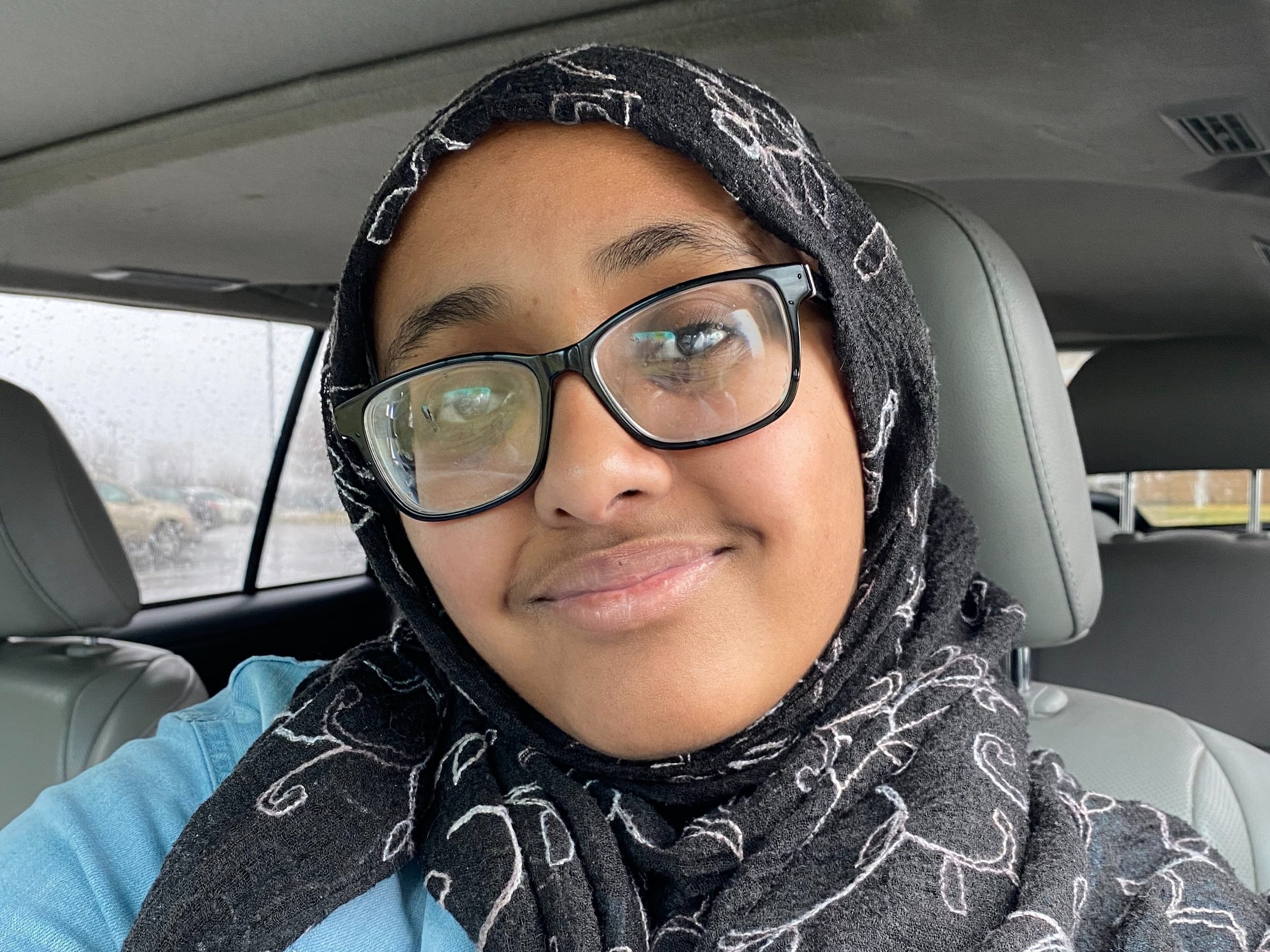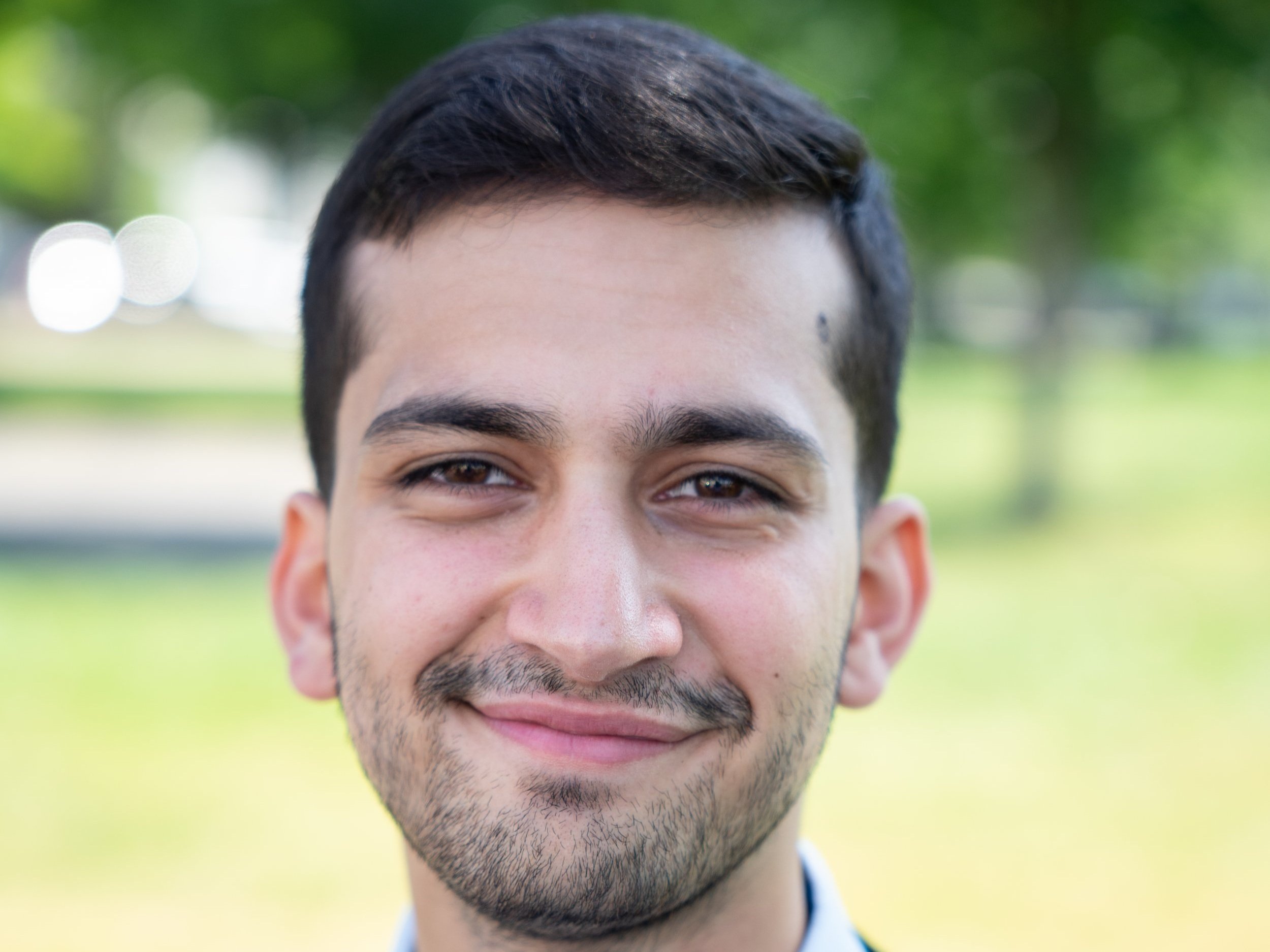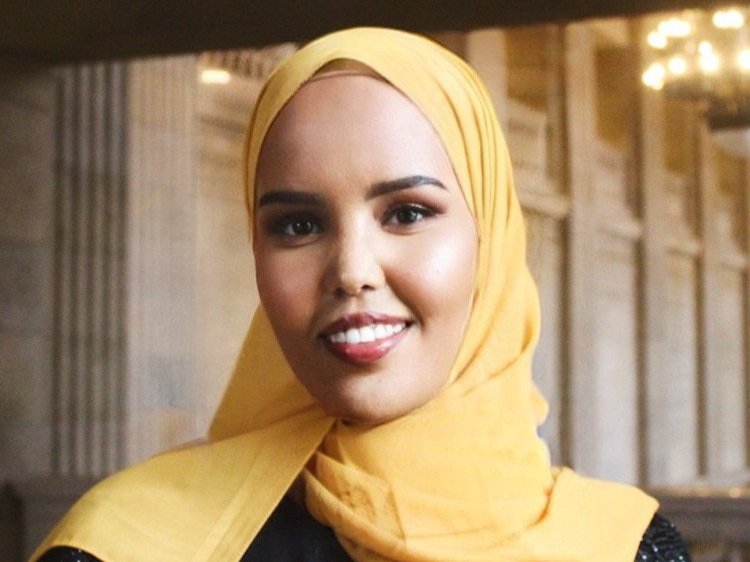Introducing our 2023 Muslim Narrative Power Fellows!
Announcing our 15 fellows as our first cohort of the Muslim narrative power fellowship! Our fellowship builds skills and connections within the Muslim community in the US to challenge the harmful discourse surrounding the War on Terror and Islamophobia. We're not just looking to make small changes - we want to drive systemic change that centers the humanity and dignity of Muslims.
Over the next five months, our fellows will come together to build a new, authentic narrative that truly represents our diverse beliefs, cultures, and lifestyles.
Read more about each fellow by clicking the plus sign (+) next to their name.
-
Binta is a proud daughter of immigrants from Gambia and is the eldest of three children. Binta was born and raised in Minnesota. She holds a Bachelor's degree in International Studies concentrating in Immigration and Refugee studies from DePaul University. The immigration journey of Binta’s parents inspired her to pursue a life of service to assist individuals who have been historically disadvantaged and isolated. Binta currently carries out this service as a public policy professional in local government. Binta values the opportunity to develop policy ideas and initiatives that allow our governments to work better for the state’s residents. What Binta loves about this profession is that when resources are redistributed to take into account the harm that has been committed against certain communities, we can build toward an atoned tomorrow. She is also grateful for the opportunity to break down barriers that residents feel when trying to access government assistance and power. Being a practicing Muslim, shapes how she shows up in her work. Binta foresees the next phase of her life’s assignment to be in the space of storytelling. Aside from her own lived experiences, she often draws from real stories of people, ideas for what is possible- both the limitless nature and limitations of a public policy approach. Binta is someone that elevates stories, heart lifting and heartbreaking, to a consciousness of others that can help curate a more decent and dignified eco-system that allows us all to live more well than before.
-
Hala is currently a fourth year at the University of Chicago studying anthropology and critical race/ethnic studies. She is a community organizer and abolitionist working towards a future free of militarism and policing. In her free time, she is a barista in the UChicago Divinity School coffee shop, Grounds of Being.
-
A graduate of the University of California, Davis, and a Gilman Scholar, Kaleemah is a dynamic young professional with experience in campaign management, community organizing, and journalism. In her current role as an Interfaith Lead Organizer within the Pacific Institute for Community Organizing (PICO California) network, she works to address inequity in the criminal justice system. Kaleemah has spearheaded programs that develop community-based restorative models for families navigating the judicial system. Her work has taken her across Latin America and Africa, where she has facilitated conversations on collaborative organizing strategies. She currently serves on the national ‘Multifaith Solidarity Cohort’ for Faith In Action, and ‘African American Insight Council’ for the Muslim Public Affairs Council. A proud Northern California native and multi-racial Muslim, Kaleemah is deeply rooted in Black liberation theology and her passion for cross-cultural and cross-continental movement building and storytelling. She enjoys spending time in nature, or reading a new book.
-
Khirad is a Ph.D. student in Criminology, Law & Society at the University of California, Irvine. She is a prison abolitionist broadly interested in Islam and the carceral state.
Her primary project examines Islam within the US prison system, and how it has come to hold such seemingly intractable associations with radicalism within the prison. This is through a historical analysis of the landscape of memory within the prison, radical prisoner organizing rooted in Islamic ideologies, and a refusal to submit to carceral authority. I’m currently working with a number of non profits, prison chaplains, and formerly incarcerated Muslims on this project.
Another project concerns honor crime in Pakistan through an analysis of the afterlives of Qandeel Baloch. This project tracks not only the carceral and imperial feminist responses to Qandeel’s death as they constructed Pakistan as a site of extraordinary patriarchal violence and the honor crime as a natural cultural category, but also the lessons that a re-reading of her life might lend abolitionists within the US.
A central aim of Khirad's work is to build the necessary and often underdeveloped linkage between the prison-industrial and military-industrial complexes, as it relates to the broader vision of abolition as a necessarily transnational project.
-
Maya is a writer from Virginia. Her work, in fiction and nonfiction, often focuses on Indian Muslims and explores topics such as immigration, minority experiences, and mixed-race identity.
-
Mikail is a Bangladeshi transmasculine & immunocompromised queer Muslim media maker, communications specialist, writer, organizer, & film curator. They grew up in Dhaka for 19 years and are currently based in Lenape and Wappinger land (Central Bronx, NY). Mikail is invested in advocating for the liberation of trans and gender-expansive people of color through an abolitionist perspective. Their creative pursuits are driven by interrogations on gender, queerness, geography and religion, and they organize with a few NYC-based grassroots groups to counter Brahminism, Islamophobia, and white supremacy.
-
Nora serves as the Communications Officer at Muslim Advocates. Prior to joining, Nora worked in the labor movement as a social justice labor communicator and organizer on campaigns like Gig Workers Rising, Justice for Janitors, Airport Workers United and more. In her time at SEIU Texas, she helped subcontracted airport workers in the fourth-largest city in America win a $12 minimum wage.
In her previous life, she was a print journalist covering issues like politics, education, business, immigration, the environment and the state legislature at media outlets like the Houston Chronicle, Houston Business Journal, Denver Westword and Community Impact Newspaper. She graduated with a bachelor of arts in print journalism and a minor in Arabic studies at the University of Houston.
In her free time, she likes to snuggle with her two cats, play with her nieces and nephews, sip coffee on patios and make music. She’s currently reading Our Women on the Ground and Evil Eye.
-
Rameen is a South Asian Muslim community organizer and a grad school hopeful based in Dallas, Texas. She got her Bachelor's degree in American Studies at the University of Texas at Dallas. Rameen has been working in the non-profit sector for four years taking on Research and Communication Associate roles. Growing up in a post-9/11 America, she has been an advocate for highlighting the Muslim youth exprience. Rameen has been featured in the South Asian Americans Leading Togther (SAALT)’s documentary, Process:20 Years Since. As a community organizer and educator Rameen ran the Asian American Pacific Islander Public Affairs Association- North Texas Chapter’s internship program for two years, mentoring and cultivating the next generation of Asian American change makers. As a firm believer in abolition, Rameen also participated as one of the MAS Dallas PACE Organziers from 2021 to 2022. Alongside her fellow PACE organizers she held community education sessions on topics such as imperialism, settler colonialism, and White Supremacy for the youth and family focused events. Rameen is also a former Muslim For Justice Futures fellow under the Muslim Wxmen’s Organzing Institute. In her free time she likes to invest her self care with iced coffee, catching up on Doctor Who, and make-up.
-
Ramis is currently a student at Emory University from Salt Lake City, Utah, majoring in Political Science and Anthropology & Religion as a joint major. He has been deeply involved in Emory’s Pakistani Student Association, Emory’s pre-law fraternity Kappa Alpha Pi, Emory Journal of Asian Studies, Emory Political Review, and Every Campus A Refugee. He currently works at the Federal Defender Program’s Capital Habeas Unit for death row inmates. He was selected as a Congressional Leadership Development Program Fellow at the Muslim Public Affairs Council (MPAC) in Washington, D.C., where he conducted research on Balochistan’s human rights. He has also worked with Americas Indivisible in San Francisco on community and mutual aid initiatives, including a resolution supporting Muslim students on Eid in the San Francisco Unified School District. At Emory University, he has assisted three senior professors on a litany of topics, such as Pakistani politics and media trends, Palestinian intellectuals, and famine as a weapon of war. He has also conducted independent research on International Relations theory, culture, and ethnic conflict. He is interested in attending law school and working in immigration law in the future.
-
Rashida serves as the Director of the Muslim Power Building Project, a dedicated community resource, training, and capacity-building space designed for new and emerging organizers. As an independent scholar and cultural organizer, she employs the art of storytelling to bridge the gap between memory, history, and pressing social issues of our time. Her scholarly and community-focused efforts are wide-ranging, encompassing sociology, social justice, and religious studies, as a means to confront and tackle gender inequality, urban displacement, carcerality, and systemic racism. Her ongoing project, "Betraying the Spectacle," explores the constructs of race and the pivotal role of cultural memory, spirituality, and placemaking within the Black Muslim women in the American South.
-
Roshni grew up in an Indian Muslim immigrant household in New York and has a background in International Studies and Sociology. She is currently based in Austin, Texas. Her experiences include community organizing and advocacy on issues related to immigrant justice, gender based violence and civic engagement. Currently, she is the Campaign Manager for Defund Hate focusing on divestment from immigration enforcement and border militarization. Roshni also enjoys dance, poetry and exploring new food places in her free time.
-
Salma is a community organizer and storyteller. Originally from Minneapolis, Salma has 8+ years of experience with community organizing in regards to racial justice, Islamophobia, and restorative justice. Salma is the co-founder and executive director of REDACT: a Muslim-led organization with a vision to end the criminalization of Muslims. We support our incarcerated community through letter writing, mutual aid, advocacy, and re-entry. REDACT also works to support Muslims unfairly targeted and prosecuted by the racist and Islamophobic policies of the war on terror.
She works to continuously push back against the ways that surveillance is institutionalized in the American Muslim community.
-
Seelai is a poet, cultural organizer, and refugee advocate from Queens, New York. A member of the Afghan American Artists and Writers Association, her work has appeared in The Massachusetts Review, Northwest Review, as well as in the New Moons anthology edited by Kazim Ali and published by Red Hen Press. She is co-editor, with Sahar Muradi, of Writing Afghan Lives Beyond the Forever War: An Anthology of Writing from Afghanistan and its Diaspora. Seelai earned an MFA from the University of Oregon.
-
Shaiba is a Kashmiri American lawyer currently working as a Legal Fellow with the American Civil Liberties Union's National Security Project. Shaiba is committed to making the law accessible for non-lawyers, particularly marginalized communities and people of color. In her free time, Shaiba enjoys watching reality TV on her phone (yes, her phone), playing fetch with her cat (yes, her cat), and singing along to songs she doesn't know the lyrics of (yes, really).
-
Urooj is a former human rights lawyer who previously worked on refugee rights advocacy internationally and tenants’ rights advocacy domestically in New York City. Urooj grew up in Bay Ridge, Brooklyn, NY where she learned the ways of the world and how to navigate it. She is currently doing advocacy work for Palestine and doing her best to be in solidarity with persecuted and oppressed people everywhere. She finds solace in music and nature, especially trees in her city.
















